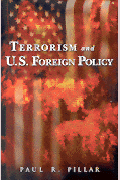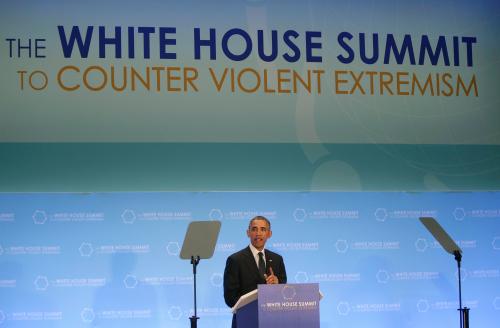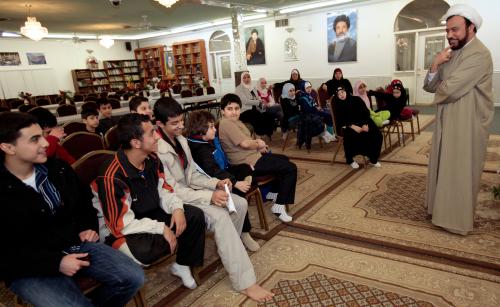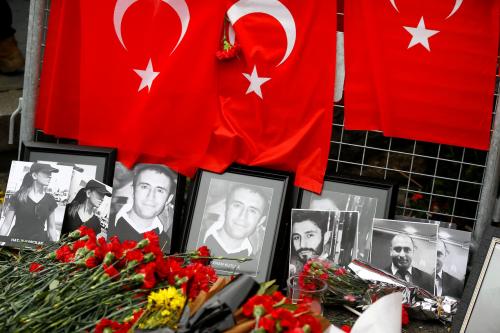As commander-in-chief, how will President Trump use his commercial know-how to tackle the problem of violent extremism? Eric Rosand and Alistair Millar explain, in a post that originally appeared on Lawfare.
Donald Trump campaigned on the promise that he would use his legendary business experience to solve the most pressing problems facing the United States and its interests abroad; stocking his cabinet with CEOs from corporate America has only raised expectations that he can deliver on this promise. As commander-in-chief, how will President Trump use his commercial know-how to tackle the problem of violent extremism? Will he—complemented by the wealthiest, most pro-business cabinet in U.S. history—do what his predecessors have failed to do and get the private sector to really step up?
Attacks like the ones that recently struck Berlin and Istanbul are now so frequent that they only remain a breaking news story for a few minutes before another atrocity takes its place on the news tickers. Innocent lives are being lost around the globe and governments seem unable to handle the threat on their own. Publics are demanding a tougher response from their governments and strengthened international cooperation among “freedom loving partners.” Political leaders acknowledge that the challenge cannot be addressed by governments alone; rather, the solutions must involve partnerships with communities, civil society, and the private sector. Some non-government experts have argued that the private sector “holds the most [untapped] promise.”
To their credit, social media and technology companies have attempted to counter the terrorist propaganda that is often disseminated on their networks by, for example, voluntarily deleting content published by terrorist groups or shutting down accounts that threaten or promote terrorism. This response was, to some extent, the result of a barrage of public pressure on companies like Facebook, Twitter, and Google from political leaders and national security officials in the United States and abroad. Companies in other industries—whether oil and gas, textiles, or hospitality—however, have yet to join a “whole of society” response to the challenge, preferring to stay clear of initiatives linked to security, particularly counterterrorism. These companies are affected by threats against soft targets. They must do more to help and to protect their own bottom line, and the Trump administration must do more than its predecessor to persuade them step up.
These companies are affected by threats against soft targets.
The business case is compelling: violent extremism poses a clear threat to companies, employees, and customers. Terrorism severs supply chains, drains local labor pools, and shakes investor confidence. The economic costs of terrorism reached $89.6 billion in 2015—its highest level ever. In the wake of the attacks in Dhaka, Bangladesh, in July, for example, Japanese firms such as Mitsubishi and Toyota withdrew essential staff and considered scaling back operations there. Some 10 percent of U.S. travelers canceled trips due to the attacks earlier this year in Egypt, France, Lebanon, and Mali, which affected more than $7.8 billion in travel spending. Air France-KLM lost an estimated $73.5 million following last November’s attacks in Paris, and airlines, hotel chains, and travel websites experienced drops in their stock prices after this year’s airport bombing in Brussels. The increasing awareness of smaller-scale terrorist and lone-wolf attacks in cities that were not deemed as potential targets has changed the political risk insurance landscape. Terrorism insurance sales have been on the rise in recent years, and more than 60 percent of companies in the United States have terrorism insurance. Companies are becoming increasingly aware of the potential direct and indirect losses they can suffer from violent extremist attacks.
Yet there are a number of barriers that have prevented companies (outside of the social media and technology sectors) from investing resources in initiatives that might prevent terrorism and violent extremism. For example, despite the increased attention that addressing the root causes of the violence now receives, military, security, and intelligence measures—sometimes controversial—continue to dominate the counterterrorism discourse. With some notable exceptions—such as social media initiatives and cybersecurity , for which public-private partnerships have developed to help address the problem by sharing cyber threat information—most segments of the private sector are unaware of the contribution that they can make on security-related issues. Many in private industry are risk averse and nervous about entering what remains a security-dominated space. They see the subject as too politically sensitive for their shareholders. Some are wary of being linked to programs that can be abused by governments to go after political opponents or to stigmatize minority communities. Others believe terrorism and violent extremism are problems for governments alone to solve. Moreover, initiatives aimed at addressing the drivers of violent extremism (e.g., marginalization, alienation, poor governance) are generally long-term projects with no real immediate returns, and any such returns are notoriously difficult to measure. Finally, the number of global issues (e.g., climate change and Sustainable Development Goals) and crises (e.g., migration and refugee) competing for private sector resources and investments continues to grow, offering corporations many opportunities to demonstrate their commitment to global citizenship without having to touch what many corporations consider to be a third rail.
Although these barriers are real, limited efforts have been made to overcome them.
Scant attention has been paid to mobilizing private sector support for the longer-term effort to build the resilience of communities around the globe to the spread of violent extremism. For example, the Global Community Engagement and Resilience Fund (GCERF), which was established in 2014 as a public-private fund to provide grants to grassroots organizations on the front lines of the fight against terrorism, has mobilized over $20 million from 12 government donors and $0 from the private sector—although a modest level of in-kind support has been mobilized from a handful of companies.
This remains the case despite the fact that there is no shortage to what the private sector can contribute to prevent violent extremism from taking root in communities and to provide young people being targeted by terrorist propaganda with positive alternatives to steer them away from violence. For example, businesses could direct much more of their corporate social responsibility projects at marginalized communities targeted by terrorist recruiters. They can join with government donors in funding community-led programs that offer alternatives, whether educational, vocational, cultural, or others; where funds aren’t available, they can offer training, mentoring, or branding expertise to grassroots organizations in at-risk communities that are implementing CVE programs and can serve as agents of positive change in their community. They could join the United States, European Union, and other international donors in funding the training of local police on how to engage constructively and build trust with the community in which the relevant companies are active, recognizing that broken trust can be a driver of violent extremism. They could contribute resources to a UNESCO-led effort to train teachers around the globe on how to use UNESCO’s first-of-its-kind teacher’s guide on preventing violent extremism.
More ambitiously, companies could join together with private foundations and wealthy individuals to invest in an initiative to support schools and other education centers that promote mainstream interpretations of Islam and critical thinking. Such projects aren’t explicitly linked to addressing violent extremism, but will still reduce the vulnerability of individuals to terrorist recruiters and are the type of initiatives that Western governments are either unlikely or ill-suited to fund for legal (e.g., Establishment Clause of the U.S. Constitution) and political reasons (e.g., risk of tainting the initiative in the very communities one is trying to reach). Such an initiative could help create a meaningful counterweight to the Saudi-sponsored spread of Wahhabism and more alternatives for young Muslims who are being drawn to schools and mosques that promote an intolerant brand of Islam and have set too many young people on a path to radicalization. Such an initiative might be particularly compelling for a president who believes that “radical Islam” lies at the root of the attacks directed or inspired by the Islamic State.
In developing his strategy to “defeat and destroy” the Islamic State and other terrorist groups, President Trump will no doubt first turn to the unprecedented number of generals in his cabinet for advice. However, if he really wants to put forward the type of dynamic and multi-dimensional approach that will be required, he should not forget about the members of his cabinet that he has assembled from across corporate America.
With this in mind—and to highlight early on the priority that his administration attaches to leveraging the diversity of private-sector support and expertise to address this challenge—President Trump should:
Make the case for why the private sector can and should step up. Whether in private or in public, he should invite U.S.-based multinational companies from across the private sector to invest in local solutions to violent extremism. If the threat is as great as the president believes, then he must prioritize mobilizing the necessary support and stimulating the required innovation and investments from within and outside government to address it. He could ask CEOs of major companies to contribute funds to existing initiatives designed to support the development of local efforts around the globe to help communities prevent their young people from being successfully recruited by the Islamic State or other terrorist groups. Rather than having multiple U.S. agencies ask for companies to finance or otherwise support government ideas or demands—a criticism of the Obama administration’s engagement with the social media and technology sectors—the focus should be on having the president himself ask them to innovate and develop their own solutions to the challenge, ones that include long-term public-private partnerships that leverage corporate know-how, not just dollars.
Existing initiatives which would benefit from private-sector support include the above-mentioned GCERF, which continues to struggle to reach its modest goal of raising $20 million per year, and the Strong Cities Network, a global coalition of cities looking to develop and share innovative approaches to countering violent extremism that has plans to launch a local innovation fund that would jump-start public-private partnerships that provide positive alternatives for vulnerable young people in key cities around the world. Both GCERF and SCN offer ready-made opportunities for corporate America to show their concrete support for this agenda and, because of their structure, process for vetting of project proposals, and branding, reduce the risk that the business community perceives about getting involved in initiatives that address violent extremism.
Launch a public-private task force. President Trump should form a task force on addressing the threat of jihadist violent extremism comprised of CEOs from Fortune500 companies and local business leaders. The president could use this task force as a platform for convening CEOs and business leaders from across the private sector to hear from them about how they can contribute to a “whole of society” effort to prevent young people in the United States and abroad from being radicalized.
Foster public-private partnerships abroad. Related to this, and given that “the national branches of multinational companies are likely to be more knowledgeable and more invested in countering violent extremism than their global headquarters, to whom extremism may seem like a smaller or more distant problem,” President Trump should ask his ambassadors in key countries to host private-sector roundtables with a view to mobilizing the heads of these branches to invest in public-private partnerships and other solutions to violent extremism.
None of these proposals, if implemented, would be a panacea. But, if implemented early in Trump’s presidency, they would send a clear signal of the president’s interest in using the accumulated and unprecedented business experience of his administration to help address what he argues is the biggest threat to our security. We hope that he does not make the mistake of emphasizing military options to address a problem for which there is no military solution. That would be a disappointing and very unbusiness-like acceptance of the status quo—in which too few companies are willing to partner with governments or otherwise support efforts to prevent violent extremism.
The Brookings Institution is committed to quality, independence, and impact.
We are supported by a diverse array of funders. In line with our values and policies, each Brookings publication represents the sole views of its author(s).










Commentary
How the private sector can be harnessed to stop violent extremism
January 31, 2017